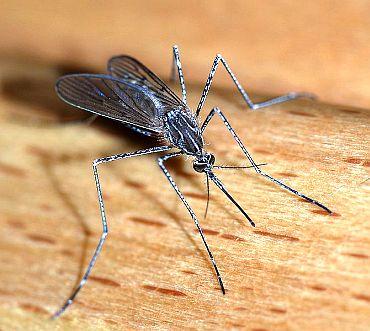 | « Back to article | Print this article |
 When Sir Ronald Ross, a British Raj army surgeon working in Hyderabad, proved in 1897 that mosquitoes could transmit malaria, it promised a new era in humanity's battle with the devastating disease.
When Sir Ronald Ross, a British Raj army surgeon working in Hyderabad, proved in 1897 that mosquitoes could transmit malaria, it promised a new era in humanity's battle with the devastating disease.
But today, over 110 years later, malaria still infects hundreds of millions of people and causes over 1 million deaths per year, despite prevention methods like mosquito eradication and personal use of insecticide and mosquito nets, thanks to the imperviousness of the blood-sucking insect. So if we can't stop mosquitoes, what can we do? Build new malaria-proof ones.
That's exactly what researchers at the University of Arizona in the US have done, in creating the first genetically modified mosquito, a strain incapable of passing on the parasite that causes malaria, Plasmodium.
The UK Independent interviewed the project's lead researcher, entomologist Michael Riehle, who said: "We were surprised how well this works. We were just hoping to see some effect on the mosquitoes' growth rate, lifespan or their susceptibility to the parasite, but it was great to see that our construct blocked the infection process completely."
It's hoped that the development could be used one day to combat malaria in tropical regions of the world like sub-Saharan Africa and the Indian subcontinent, where high mosquito populations make malaria a dreaded killer. The theory is that modified mosquitoes could be released into the wild to compete with normal malaria-carrying mosquito populations. But that day appears to still be far off in the future.
Not all mosquitoes transmit malaria. Of the thousands of different mosquito species, only females from 30-40 species of the anopheles genus are capable of passing Plasmodium on to humans. When females from these species bite an infected victim, they ingest the parasites, which incubate and multiply and later migrate to the mosquito's salivary glands, where they are passed on during the mosquito's next bite.
For years, this elegant transmission method has baffled the best efforts of modern medicine. But now Riehle and his team have inserted a gene to increase the enzyme Akt, which helps determines a mosquito's growth rate and immune system. Theoretically, the enhanced Akt function should help the insect's immune system fight off the malaria parasite, while also cutting the mosquito's lifespan.
"In the wild, a mosquito lives for an average of two weeks. Only the oldest mosquitoes are able to transmit the parasite," Dr Riehle told the Independent. "If we can reduce their lifespan, we can reduce the number of infections."
The team's studies showed that modified mosquitoes carrying two copies of the altered gene entirely lost the ability to transmit malaria. Now, scientists must figure out how to introduce the new mosquitoes into present mosquito populations, and ensure they have natural advantages so that they can replace the originals.
Dr Riehle said this would be the most difficult task.